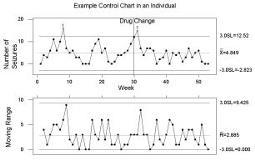STATISTICAL PROCESS CONTROL (SPC): IS THERE A ROLE IN THE MANAGEMENT OF CHILDREN WITH SEVERE EPILEPSIES
Abstract number :
2.157
Submission category :
Year :
2005
Submission ID :
5461
Source :
www.aesnet.org
Presentation date :
12/3/2005 12:00:00 AM
Published date :
Dec 2, 2005, 06:00 AM
Authors :
1Sophie Calvert, 2Matthew Pitt, and 1,2,3Rod C. Scott
Some of the most difficult decisions in the management of children with severe epilepsies relate to initiation and termination of antiepileptic drugs. These decisions are usually based on history taking from parents whose views are likely to be coloured by recent events. This may lead to over-treatment on the basis of short-term changes in seizure frequency. Severe epilepsy can be considered to be a stable process and as such therapeutic changes would only be required if the stable process went out of control. Thus, the aim of this study is to determine whether statistical process control can provide objective evidence for system instability that would stimulate initiation or withdrawal of antiepileptic medications. The National Centre for Young People with Epilepsy (NCYPE) is a residential school with medical services on site. Children enrolled at NCYPE have seizure diaries kept and as the children have very close supervision at all times the diaries are considered to be accurate. Weekly seizure frequency over a period of 1 year was retrospectively collected in 10 randomly selected children. Individual and moving range control charts (for example see figure) were generated for each child and Nelson[apos]s tests were applied in Minitab version 12. These tests provide evidence for a stable process becoming unstable. Timing of antiepileptic drug changes were mapped onto the control charts. 8 of the 10 children had medication changes during the course of the year. In two children there was evidence for that change being on the basis of the system becoming unstable. Two children showed a change in the system following a medication introduction, one of whom had evidence for system instability prior to the medication change. There was no objective evidence to support drug manipulations that occurred in any of the other children. SPC provides an easy and robust way to objectively decide upon whether medication changes are appropriate. As the majority of the children in the current pilot study do not show convincing evidence for periods of system instability, or for effectiveness of medication changes, use of SPC may reduce the number of unnecessary interventions in individual children, and may shorten the length of unsuccessful therapeutic trials.[figure1]
